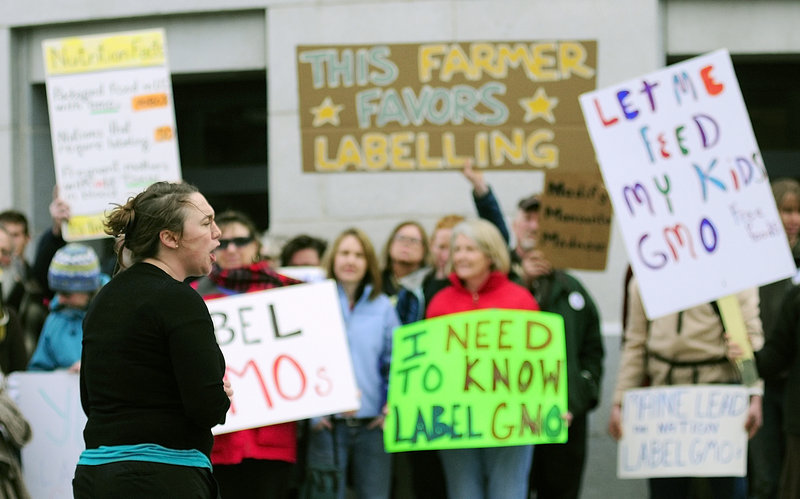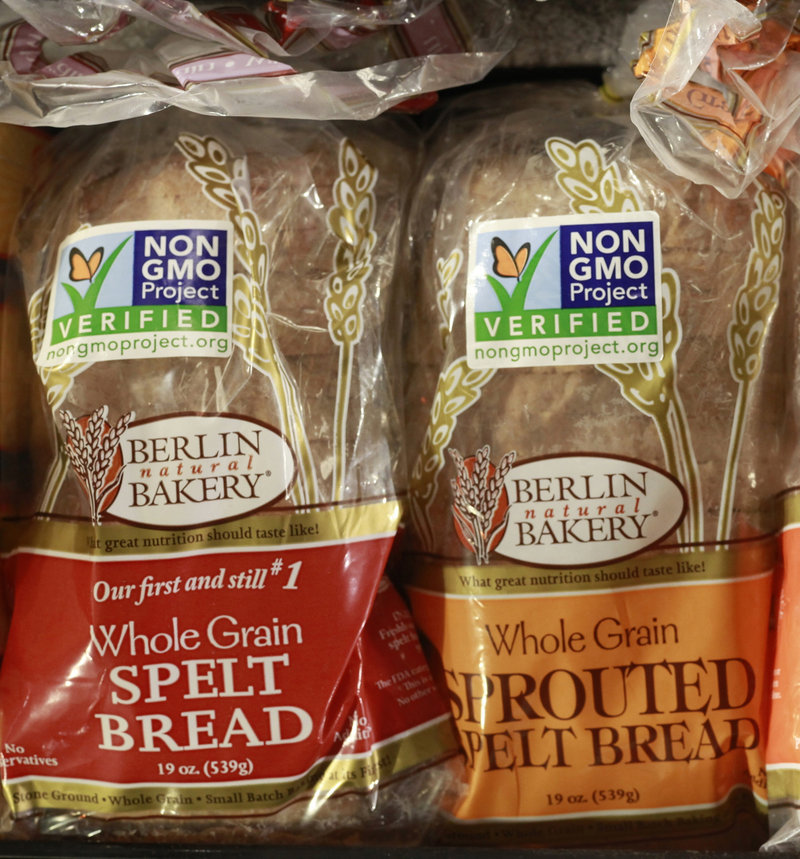AUGUSTA – Advocates for a bill that would require food producers to label products that contain genetically modified ingredients believe they have won a key ally: Gov. Paul LePage.
The governor hasn’t confirmed that he will sign L.D. 718, a bill inspired by a national movement that has pitted the food production and agribusiness industry against well-organized and energized activists. But the bill is positioned in a way that would let LePage sign it early next year and give Maine time to plan its response to a potential lawsuit by Monsanto. The company has threatened to sue states that pass food labeling laws.
“If this allows us to get our ducks in a row and ease some of the fears of (Attorney General Janet Mills), I’m OK with it,” said Rep. Lance Harvell, R-Farmington, the sponsor of L.D. 718. He was referring to Mills’ comments to lawmakers in May that the bill is almost certain to face a legal challenge.
The delay could also buy time for other states to adopt labeling laws, which supporters hope will prompt the federal government to draft a national standard for foods that are bioengineered — their DNA spliced with that of unrelated plants, animals, bacteria or viruses.
The government’s reluctance to draft a national food labeling law has been the impetus for the 50-state strategy by activist groups. So far, L.D. 718 has counterparts in 30 states.
Scott Faber, executive director of Just Label It, a national advocacy group, said Monday that states aren’t waiting for the federal Food and Drug Administration to act on the labeling requirement, but are “ultimately hoping that it will.”
Faber, who from 2007 to 2012 was a lobbyist for the Grocery Manufacturers Association, one of the trade organizations fighting the labeling effort, said a “firestorm” of action in state legislatures has caught the industry off-guard.
It now must decide whether to keep fighting in each state by spending money on lobbying and lawsuits, or work with consumer activists and the federal government to adopt labeling standards.
“It’s very costly, in both dollars and brand reputation, to continue to fight these fights,” said Faber. “It’s just bad business for food companies to continue to fight in 50 states when they could ultimately work with the FDA and consumer advocates for a federal solution.”
There is speculation that the industry is preparing a federal approach. Last week The Hill, a Washington, D.C.-based publication, obtained a letter showing that food industry giants had scheduled a summit that could signify a new approach in the battle over genetically modified foods.
Faber said he was unaware of the meeting, but it makes sense for the industry to consider ending a multistate fight.
“Consumers in Massachusetts will demand the right to know what’s in their food as much as consumers in Maine or Maryland,” he said.
The industry says labeling misleads consumers into believing that bioengineered ingredients are less safe or less healthy than other foods. It has cited a statement by the American Medical Association last year that found no evidence that bioengineered foods are more dangerous than other foods.
The U.S. Department of Agriculture estimates that 70 percent of the processed food in American supermarkets has genetically modified ingredients.
Faber said labeling such products probably wouldn’t change consumer behavior, but “fighting labeling is certainly undermining the trust that many consumers have in these big brands. . . . It creates the sense that big-brand companies have something to hide.”
Advocates say that perception is compounded by the fact that the federal government has left testing to the industry.
The FDA regulates genetically modified foods but does not approve them. It assumes the foods are safe until confronted with evidence that they’re not.
Faber said the industry could face a less desirable outcome than labeling products: congressional consideration of a regulatory system.
A federal labeling law may be the best result for states, too, Faber said. The threat of legal action by deep-pocketed industry groups has made attorneys general and state lawmakers nervous.
Maine Attorney General Mills told lawmakers in May that she could not guarantee that her office would be able to defend the constitutionality of L.D. 718.
Harvell, the sponsor, later agreed to amend the bill so the labeling requirement wouldn’t take effect until five contiguous states, including Maine, passed similar legislation. The change was designed to split potential court costs among several states.
The cost is also driving the move to allow LePage to sign the bill next year.
L.D. 718 requires one final vote in the Senate. That vote is scheduled Tuesday, before the Legislature ends this session.
According to the state Constitution, adjournment essentially stops the clock on action required by the governor to veto or allow a bill to become law. The clock starts again when the Legislature reconvenes, allowing the governor and the Legislature to act on bills within three legislative days.
Adrienne Bennett, the governor’s spokeswoman, would not comment on LePage’s stance on L.D. 718, which has won unanimous votes so far in the Senate and House.
Heather Spalding, acting director of the Maine Organic Farmers & Gardeners Association, one of the lead advocates for the bill, said her group has been assured that the governor will sign it next year.
Although that isn’t yet in writing, Spalding said, it would be “unimaginable” for LePage “not to come through.” She noted the energy of an advocacy effort that has been embraced by both political parties.
Connecticut recently became the first state to enact a food labeling law. The law includes a contiguous-states requirement, but Harvell said such a provision may not stop Monsanto or another industry group from filing a lawsuit.
“If Connecticut goes first and gets sued, then Maine can prepare its defense,” Harvell said.
Faber said other states with labeling bills are considering similar “legislative caveats.”
Steve Mistler can be contacted at 620-7016 or at:
smistler@pressherald.com
Twitter: @stevemistler
Send questions/comments to the editors.




Success. Please wait for the page to reload. If the page does not reload within 5 seconds, please refresh the page.
Enter your email and password to access comments.
Hi, to comment on stories you must . This profile is in addition to your subscription and website login.
Already have a commenting profile? .
Invalid username/password.
Please check your email to confirm and complete your registration.
Only subscribers are eligible to post comments. Please subscribe or login first for digital access. Here’s why.
Use the form below to reset your password. When you've submitted your account email, we will send an email with a reset code.